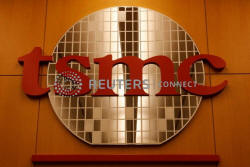U.S. mulls cutting Huawei off from global chip
suppliers, with TSMC in crosshairs
 Send a link to a friend
Send a link to a friend
 [February 18, 2020] By
Alexandra Alper and Karen Freifeld [February 18, 2020] By
Alexandra Alper and Karen Freifeld
WASHINGTON (Reuters) - The Trump
administration is considering changing U.S. regulations to allow it to
block shipments of chips to Huawei Technologies from companies such as
Taiwan's TSMC <2330.TW>, the world's largest contract chipmaker, two
sources familiar with the matter said.
New restrictions on commerce with China's Huawei are among several
options to be considered at high-level U.S. meetings this week and next.
The chip proposal has been drafted but its approval is far from certain,
one of the sources said.
The measure would be a blow to the world's no. 2 smartphone maker as
well as to TSMC, a major producer of chips for Huawei's HiSilicon unit
and mobile phone rivals Apple Inc <AAPL.O> and Qualcomm Inc <QCOM.O>.
"What they’re trying to do is make sure that no chips go to Huawei that
they can possibly control,” the second source said.

Huawei is at the heart of a battle for global technological dominance
between the United States and China. The United States is trying to
convince allies to exclude its gear from next generation 5G networks on
grounds its equipment could be used by China for spying. Huawei has
repeatedly denied the claim.
To target global chip sales to Huawei, U.S. authorities would alter the
Foreign Direct Product Rule, which subjects some foreign-made goods
based on U.S. technology or software to U.S. regulations.
Reuters reported possible changes to that rule in November.
Under the draft proposal, the U.S. government would force foreign
companies that use U.S. chipmaking equipment to seek a U.S. license
before supplying Huawei - a major expansion of export control authority
that could anger U.S. allies worldwide.
The U.S. Commerce Department declined to comment on the proposal.
[to top of second column] |

A logo of Taiwan
Semiconductor Manufacturing Co (TSMC) is seen at its headquarters in
Hsinchu, Taiwan August 31, 2018. REUTERS/Tyrone Siu

But a Commerce spokesman said recent U.S. charges against Huawei, including
conspiring to steal trade secrets, "reaffirm the need for caution in considering
license applications. The U.S. continues to have major concerns about Huawei."
Huawei did not respond to requests for comment.
A spokeswoman for TSMC said the company does not answer "hypothetical" questions
and does not comment on individual customers.
The United States placed Huawei on a blacklist in May last year, citing national
security concerns. That forced some U.S. and foreign companies to seek special
licenses from the Commerce Department to sell to it, but China hawks in the U.S.
government have been frustrated by the vast number of supply chains beyond their
reach.
Others in the Trump administration fear antagonizing Beijing, which just signed
a trade deal with Washington. They also worry the restrictions will drive
innovation offshore and benefit foreign rivals.
Most chip manufacturers rely on equipment produced by U.S. companies like KLA <KLAC.O>,
Lam Research <LRCX.O> and Applied Materials <AMAT.O>, according to a report last
year from China's Everbright Securities.
"There is no production line in China that uses only equipment made in China, so
it is very difficult to make any chipsets without U.S. equipment," Everbright
wrote.
(Additional Reporting by Stephen Nellis; Writing by Alexandra Alper; Editing by
Gary McWilliams and Sonya Hepinstall)
[© 2020 Thomson Reuters. All rights
reserved.] Copyright 2020 Reuters. All rights reserved. This material may not be published,
broadcast, rewritten or redistributed.
Thompson Reuters is solely responsible for this content. |